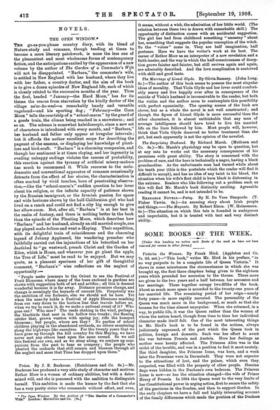NOVELS.
THE OPEN WINDOW.* THE go-as-you-please country diary, with its blend of
Nature-study and romance, though tending at times to become a mere literary patchwork, is none the less one of
the pleasantest and most wholesome forms of contemporary fiction, and the anticipations excited by the appearance of a new volume by the author of The Garden of a Commuter's Wife will not be disappointed. "Barbara," the commuter's wife, is settled in New England with her husband, where they live with her father, a country doctor, and the aim of the book is to give a dozen episodes of New England life, each of which is closely related to the successive months of the year. Thus the first, headed " January—the Hard Moon," has for its theme the rescue from starvation by the kindly doctor of the village ne'er-do-weel—a remarkably handy and versatile
vagabond—and his sporting dog ; " February—the Coon Moon " tells the courtship of a " school-marm " by the guard of a goods train, the climax being reached in a snowstorm ; and so on. The scheme is somewhat kaleidoscopic, since a new set of characters is introduced with every month, and " Barbara," her husband and father only appear at irregular intervals ; but it affords the author excellent scope for describing the pageant of the seasons, or displaying her knowledge of plant- lore and bird-craft. " Barbara" is a charming companion, and though her sentiment is at times cloying, and her ingenuity in evading unhappy endings violates the canons of probability, this reaction against the tyranny of artificial misery-makers has much to recommend it. While recourse to the melo- dramatic and conventional apparatus of romance occasionally detracts from the effect of her stories, the characterisation is often marked by vivid touches, born of penetrating observa- tion,—like the "school-marm's " sudden question to her lover about his religion, or the infinite capacity of patience shown by the Russian immigrant, or the feverish passion for space and wide horizons shown by the half-Californian girl who had lived on a ranch and could not find a city big enough to give her elbow-room. But, after all, " Barbara " is at her best in the realm of fantasy, and there is nothing better in the book than the episode of the Planting Moon, which describes how "Barbara" and her husband, already an old married couple, one
day played make-believe and went a-Maying. Their expedition, with its delightful train of coincidences and the charming
legend of Johnny Appleseed, the wandering preacher who faithfully carried out the injunctions of his betrothed on her deathbed to " go westward, preach Christ and the Garden of Eden, which is Home, and wherever you go plant the apple, the Tree of Life," must be read to be enjoyed. But we may quote, as a pleasant specimen of her gift of thoughtful comment, " Barbara's " wise reflections on the neglect of opportunity :—
" People make journeys to the Orient to see the Festival of Fruit Blossoms, where many of the trees enclosed in gardens are shown with suggestion both of art and artifice ; all this is deemed wonderful because it is far away. Distance promises change, and change is seemingly the keynote of current life. Perpetuity was the ambition of our forbears, else we should not be here. Yet when the near-by holds a Festival of Apple Blossoms reaching from our very doors to the horizon line that travels before us, when we try to reach it, do we make a national event of it ? Who goes out ? Who sees ? The reeds shaking in the wind, perhaps ; the bluebirds that nest in the hollow tree trunks ; the flaming orioles that, grown wanton with spring joy, rifle the honeyed blossoms ; but people, where are they ? No parties of school children playing in the abandoned orchards, no others sauntering along the highways like ourselves. For the twenty years that we have gone up through the hill country for this Maying, we have never met any others bent upon the same errand. So we call this festival our own, and as we stray along, we conjure up com- panions from the past to bear us company ; the people who planted the orchards that still remain and blossom through all the neglect and moss that Time has dropped upon them."










































 Previous page
Previous page